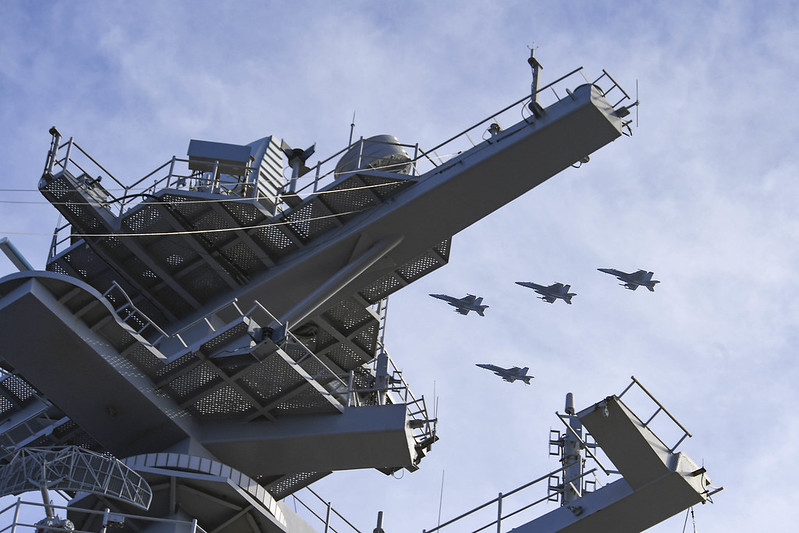
Sea state
The US Navy has stepped up its presence in the Indo-Pacific, in a rare deployment of three aircraft carriers to the region. USS Theodore Roosevelt has been deployed near Guam, USS Nimitz near the US west coast, and USS Ronald Reagan near the Philippines. The last time three carriers and their strike group squadrons were deployed in the region was in 2017. The move has been interpreted as a warning to Beijing in light of rising tensions between the US and China over the Covid-19 pandemic, Hong Kong’s autonomy, and China’s South China Sea claims.
Australia and India have brokered a joint defence agreement that will enable their militaries to share facilities and work together. In particular, joint naval exercises are expected to be held in the eastern Indian Ocean, home to India’s Andaman and Nicobar Islands and the Australian territories of Christmas Island and Cocos (Keeling) Islands. The deal was signed following last week’s virtual meeting between India’s Prime Minister Narendra Modi and Australia’s PM Scott Morrison.
Flight path
The US Air Force and Boeing have completed critical design reviews for the T-7A Red Hawk advanced pilot trainer. While the Covid-19 pandemic has forced personnel to conduct the reviews virtually, the team has successfully used ‘advanced engineering digital design practices …, enabling faster delivery of a high-quality product to the warfighter’. The T-7A program, which commenced in 2018 under a US$9.2 billion contract, aims to equip student pilots with the skills they’ll need to transition to the most advanced fighter aircraft.
The Royal Danish Air Force is set to receive its first F-35A fighter jet later this year. The country evaluated the Eurofighter Typhoon and the F/A-18F Super Hornet to replace its ageing fleet of F-16s before settling on 27 F-35As from Lockheed Martin for US$3 billion in 2016. The Danish Ministry of Defence concluded that the F-35As were ‘the best choice for Denmark’ based on strategic, military, economic and industrial considerations.
Rapid fire
As the anti-racism protests after the death of George Floyd continue to spark debate on systemic racism in American institutions, CNN has found that black Americans are under-represented among higher ranks of the US military. This means they’re more likely to serve on the front line in conflict and suffer severe injuries during their service. In addition, earlier polling found that most minority active-duty troops had experienced racial discrimination or seen signs of white nationalism. In an effort to address these problems, US Army officials have said they’re willing to consider renaming bases that honour Confederate military leaders.
A German government testing authority has approved Australian manufacturer Bisalloy Steel Group’s high-performance ‘O-grade’ steel, placing the company among top global producers of the material. Rheinmetall Defence Australia will build almost 200 Boxer armoured vehicles for the Australian Army using Bisalloy’s steel, in collaboration with German contractor Krauss-Maffei Wegmann.
Final frontier
After an almost three-month delay, Rocket Lab launched five satellites on a two-stage Electron booster from New Zealand for the US National Reconnaissance Office, NASA and UNSW Canberra. Three NRO payloads were sent to explore new ‘launch opportunities’ to send small satellites into orbit, and NASA deployed a cubesat called Andesite to study the earth’s magnetic field and space weather. UNSW Canberra Space and the Royal Australian Air Force will test communication capabilities via their M2 Pathfinder.
The final Beidou-3 satellite will be launched this month to complete China’s navigation network. China launched the first Beidou satellites in 2000 in a bid to reduce its military reliance on the US global positioning system, but Beijing is now promoting its global space services under its ‘Space Silk Road’ program. According to Chinese state media, at least 300 million users from over 200 countries and regions are currently using Beidou’s services and products.
Wired watchtower
A submission from the Department of Home Affairs to the Senate committee investigating foreign interference through social media has presented a number of recommendations. Better regulation of social media platforms such as Facebook, Twitter and WeChat was suggested as one way to respond to the threat. The submission also emphasised that improving digital literacy to enable people to recognise inauthentic content is more effective in countering disinformation on social media.
Amazon has placed a one-year ban on US police departments using its facial recognition software amid concerns that bias in artificial intelligence can lead to racist policing practices. Amazon’s ban came two days after IBM announced it would stop developing or offering facial recognition technology to law enforcement for the same reason. Microsoft joined the other two companies shortly after, and although it hasn’t sold facial recognition tech to US police, it said it won’t do so until there’s ‘a national law in place, grounded in human rights, that will govern this technology’.

